Rituals for Weaning: Making Your Baby's Mealtimes Memorable with @morningaltars Day Schildkret
- Why mealtime rituals are important for families and how these moments can help acknowledge the transition of weaning in babies
- How to make a ritual out of the transition to baby-led weaning and making mealtimes memorable
- Emotional involvement parents have during the transitional phase of introduction to solids foods
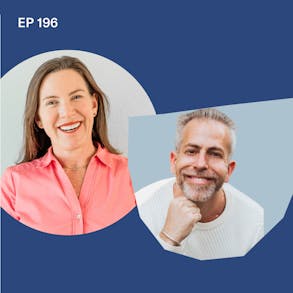
LISTEN TO THIS EPISODE
Episode Description
How can you make your baby’s mealtime memorable? Day Schildkret is an internationally renowned artist who has inspired many people around the world to reconnect with nature and creativity through the practice of earth art, ritual, and mindfulness.
In this episode, artist, author, and teacher Day Schildkret talks about the importance of
enjoying and honoring a baby’s transition from milk into baby foods through the practice of mealtime weaning rituals.
About the Guest
- Day has taught people from around the world how to create your own ritual using Day’s “ritual recipe”
- Day leads the Behind Morning Altars movement: offers workshops, trainings and public speaking events worldwide
- He is also the author of Hello, Goodbye: 75 Rituals for Times of Loss, Celebration, and Change and the author of Morning Altars: A 7-Step Practice to Nourish Your Spirit through Nature, Art and Ritual

Links from this Episode
- Check out Day Schildkret’s new book out January 2022 Book Hello, Goodbye 75 Rituals for Times of Loss, Celebration, and Change
- Learn more about Day Schildkret

- Website: Morningaltars.com
- Baby-Led Weaning with Katie Ferraro program with the 100 First Foods™ Daily Meal Plan, join here: https://babyledweaning.co/program
- Baby-Led Weaning for Beginners free online workshop with 100 First Foods™ list to all attendees, register here: https://babyledweaning.co/baby-led-weaning-for-beginners

Latest Episodes

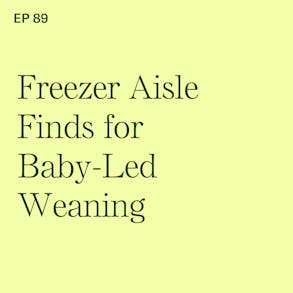
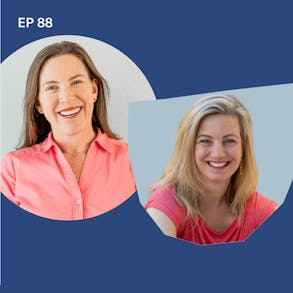
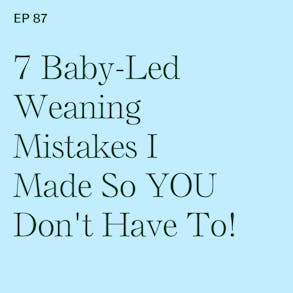
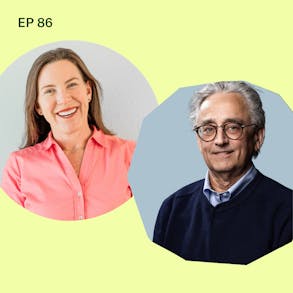
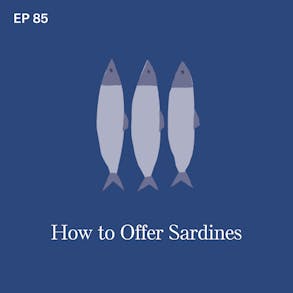
Day Schildkret (1m 3s):
Do something that acknowledges that this matter, that this moment meant something to you. And now you're moving on from that try and linger at that moment for as long as you can, because then you honor that time.
Katie Ferraro (1m 17s):
Hey, there Im Katie Ferraro, Registered Dietitian college nutrition, professor and mom of seven specializing in baby led weaning here on the baby led weaning made easy podcast. I help you strip out all of the noise and nonsense about feeding, leaving you with the competence and knowledge. You need to give your baby a safe start to solid foods using baby led weaning. All right, guys, I've got a little bit of a different topic episode for you today. This one is kind of out of my comfort zone. My guest today is Day Schildkret. He is an author. He is an artist. He is a creator. He wrote to me and he was like, I need to be on your podcast.
Katie Ferraro (1m 59s):
And I was like, okay, thank you for your interest. Do you have a baby? Like, are you interested in baby led weaning? He's like, no, I'm an author. And I write about ritual and I, I want to talk about the ritual of weaning and taking time to acknowledge the transition of a baby, moving from a milk only diet, breast milk, or formula to solid foods. And he talked me into it. And I was like, I don't know about this topic, but you guys I'm normally used to talking to like medical doctors about GERD or other parents about their babies, but day. Okay. He's also known as morning altars. He is an internationally renowned artist. He's inspired thousands of people around the world to reconnect with nature and creativity. I am not a nature person and neither would I consider myself creative.
Katie Ferraro (2m 40s):
So it was like day. I don't know if this interview is going to flow. So he helped me write the questions and I read his book and I do think he has a lot of very valuable things to say about slowing down and making a ritual out of this transition into baby's food. So he's got a brand new book out, which he's going to tell you about as well called hello, goodbye. But as we bring in the new year here, I'm thinking you guys might like this topic and I'm hoping that you do. And with no further ado, I want to introduce you to date Schildkret. Who's going to be talking about Rituals for Weaning and Making Your babies meal times memorable,
Day Schildkret (3m 20s):
Happy to be here.
Katie Ferraro (3m 21s):
And I have to admit, I was surprised to see you addressing weaning in your most recent book about rituals. So I want to learn more about that, but before we dive in, could you please just tell us a little bit about yourself and the type of work that you do?
Day Schildkret (3m 32s):
I am a author. I'm an artist, I'm a teacher for the past 10 years. I've had a practice that has been called the morning altars, which is I go around the world and basically teach people how to make altars out of nature as a way to make meaning in their lives and to mark important moments. And so that's a seven step practice that I've cultivated and it turned into an international sensation. And so I tour around the world teaching this practice and I just finished a new book. And so this new book is focused primarily on Rituals.
Katie Ferraro (4m 7s):
So why are rituals important and more importantly for our audience? Why are mealtime rituals important for families?
Day Schildkret (4m 15s):
I say first and foremost, we have to understand why rituals mostly don't happen. I'd say most of us are incredibly busy. We're moving way too fast. We have so much on our schedules, we're overloaded and all of these important moments. Some of them really small, some of them really big pass us by and before we know it. We're onto the very next thing. Ritual is a way to basically slowed down time. Sometimes we need to slow down time because what we just experienced is traumatizing or upsetting, or there's a lot of grief there, like a death or loss of a pet. And sometimes it's celebratory.
Day Schildkret (4m 55s):
Like we just accomplished something or became a grandparents, but either way the movement of our lives these days, it's like always onto the next thing. And so there's a lot of stress. There's a lot of overwhelmed. There's a lot of anxiety that comes with that. Almost forced pressure that pushes us forward. Ritual is literally a way to create what I call time boundaries. So they slow us down so that we can turn towards or pivot towards the real moments in our lives. And weening is a real moment in our life.
Katie Ferraro (5m 29s):
It's funny. I think all new parents or parents in general would agree with you, but especially those of babies, like, oh my gosh, it goes so fast. Like everyone tells you that. And I'm looking back. My, I have seven small children. My youngest are three now, but it feels like just yesterday that we were doing baby led weaning with all of our babies. And I was curious if you could give us some maybe concrete examples, because I think the way you're talking about ritual, this is something you talk about all the time, but this is definitely a new concept for me and for my audience. What are some concrete ways in which we can slow down and make ritual around feeding and mealtime during the weaning process?
Day Schildkret (6m 5s):
Sure. I'll give you an example of that actually just happened to two of my best friends this past weekend, which is their infant actually had food for the first time. And they actually gathered a lot of friends and family to witness that moment. And so it wasn't just something that happened in private and actually got witnessed by their community. And so there was people brought beautiful fruits and flowers and there was candles lit and there was a song that was song. And what happened was there was a community that got to witness this new baby, eating his first food for the first time.
Day Schildkret (6m 47s):
And just being witnessed is the capacity to turn towards something, to look at something with more intention and more meaning. And when we invite other people to help us do that, it creates a sense of connection so that everyone that gathered around this baby that got to witness his first foods is now even more connected and tied to the actual baby's life. So it's a very small example of taking a moment and making it meaningful. After
Katie Ferraro (7m 17s):
College, I was a peace Corps volunteer in Nepal, and I was so amazed by the Hindu community that I lived in for two and a half years. They celebrated the baby's first eating of rice. So you would get invited to rice feeding ceremonies. I remember the first time my friends and I got invited to them, we're like, Hey, have you ever been invited to one of these things? Like, what do they do? Oh, they feed the baby rice for the first time. It's like so many other food cultures do celebrate the transition to solid foods. And we tend not to do that in the United States. So I'm curious the family that you were just describing, do they ascribe to, or would you say they belong to a particular food culture or was this just something they decided to do? Because it's certainly not typical in your Western society?
Day Schildkret (7m 54s):
It's definitely not. And I'd say they joined it together. They're two people who are coming from the Jewish tradition and we are just selling. We just celebrated our new years and there's a lot of festivals that just happened that happened in the fall. And so there's this one festival that's called Sucot, which is about gathering outside. It's about eating outside. It's about remembering our ancestors wandering in the desert and it's a harvest festival. There's a lot of fruits and vegetables of the harvest. And so they decided to, they was time. The baby was giving signs that, that it wanted to eat more solid foods. And so they tied it to this festival. So there was already a gathering that was happening and they brought the meaning of this moment to that experience.
Day Schildkret (8m 40s):
And so it is unique and it also was made that moment even more meaningful. I have another friend who recently weaned her baby and she has a tradition in her family that I wrote about in this new book, hello, goodbye, where she fills up a baby pool with cow's milk and there's cheeses and other there's other dairy products around the baby. And so it becomes this fun kind of wild experience that the baby gets to play in this kiddie pool that is filled with cows milk. And it's just this moment, that's both joyful and meaningful and creative that that particular mother did with both her first born.
Day Schildkret (9m 26s):
And now her second baby,
Katie Ferraro (9m 28s):
A little bit about the emotional involvement that parents can and should have when it comes to helping their babies transition to solid foods.
Day Schildkret (9m 36s):
I've interviewed a lot of mothers and birthing parents around weaning, and some of them reported back. This was a celebratory, this I'm getting my body back. I'm getting my time back. Some of them reported back that there was, was a moment of grief. This was like a way that they were almost severing a certain connection with their baby. I don't know if you know this, but the word sever to sever or to cut etymologically like the root of the word actually means to Weem. So there's a feeling that happens in that moment of severing, this connection or this bond between the baby and the mother or the birthing parents.
Day Schildkret (10m 17s):
And there's grief there, there's happiness. There there's a lot of this mixed emotion, even mothers that I interviewed that originally started off this interview saying, I was great. I'm happy to be in my baby. I'm ready for this. I'm ready to have my body back. I'm ready to have this baby be eating actual food. By the end of the conversation, they actually started to talk about the grief and missing that connection, missing that way of connecting with the baby. And so what's happening in this moment of meaning at this threshold is there's mixed emotion. There's this happiness and celebration and joy.
Day Schildkret (10m 57s):
And then there's also grief and longing and that severing feeling. And so ritual is this way where we can actually invite both of these feelings to exist and you can presence the celebration and the joy. And you can also presence the longing and the grief, and just taking a moment to do something to mark this moment and make it meaningful weaning as a meaningful moment to actually say this mattered well, that gives people a sense that they can move forward in their lives and move, and the baby can move forward.
Katie Ferraro (11m 30s):
And these changes can feel so overwhelming when we're in them. And then you look back, it was a little blip in time. I teach a hundred first foods approach to baby led weaning a program I created in 2016 and we get parents a hundred first foods list and they go through and they offer five new foods a week. It's 20 new foods a month. By the end of five months, their baby has tried a hundred foods. And a lot of the parents now they check it off or they'll, they'll laminate it. They put it on the fridge and then they ended up putting the a hundred first foods copy of the foods their baby ate in their baby book. Just as a reminder of these are all the different foods that you tried. And we tried together before you were one. And that's maybe one way that we could mark the ritual of this transition to solid foods.
Day Schildkret (12m 11s):
Absolutely. And so I wrote this book called hello, goodbye. And the way I talk about it is very much like a cookbook, like a ritual cookbook, which is I offer ritual recipes for people to do. That's very accessible. There's like, kind of like when you're making a meal, you know, what are the ingredients that you need? How do you prepare it? What do you do? And how do you conclude it? I mean, that's very much how the book is written. So I offer two rituals that are very much like a recipe in this book. But the thing about ritual is that you can create your own. You really like in this book, I'm offering ingredients. So you can take some of the ingredients that work for you, and you can leave some behind that don't work for you.
Day Schildkret (12m 52s):
But I think what I'm pleading for an advocating for, especially around people that are weaning is do something, do something that acknowledges that this mattered, that this moment meant something to you. That that time of breastfeeding was important. And now you're moving on from that and try and linger at that moment for as long as you can, because then you honor that time and you can move on from there. And it allows you to feel the significance of that moment. And really that's what Rituals advocating for. It's, it's distinguishing this from that. I was breastfeeding and now we're weaning off the breasts and the ritual set is helping to distinguish this moment from that moment,
Katie Ferraro (13m 40s):
Your story there, it reminded me of a story. Recently, I was helping a friend start solid foods with her baby. And the day before I went to help her do the first day of food, she texted me late at night and she said, so does this mean that, that was the last time that I breastfed my baby? And I kind of gasped like, oh my gosh, it could be if you wanted to, but it doesn't have to be in most certainly babies will continue to receive the majority of their nutrition from breast milk or formula as you start solid foods. But she just thought, well, gosh, I've worked so hard at this and now I have to give it all up tomorrow. It was like, no, we have to look at what your goals are. What does your baby need right now? What do both of you want? And there's no one right answer. So I kind of take offense whenever it says, you know, you have to do it this way or you have to do it that way.
Katie Ferraro (14m 24s):
I know personally for a couple of my babies at six months, I definitely wanted to be done. Then there's other times where you want it to extend as long as possible and no way is wrong.
Day Schildkret (14m 32s):
What you're naming right now. I actually felt a little emotion in that because when you said that, like, is this the last time that very question is at the heart of this book? I mean, I called the book, hello, goodbye. Because there are these moments of saying goodbye to something and saying hello to something. And if we're only saying hello to the new thing, to the new way, we're only doing half of what's actually happening, but actually saying goodbye is really, really important. You know, as you said, working so hard to get to that moment, and then you actually have to say goodbye to it because something's changing, that's emotional. And if we don't properly say goodbye and this mattered, and this was meaningful, then we're not truly honoring the threshold of that moment.
Katie Ferraro (15m 21s):
Dave, thank you so much for this information and tell us where we can go to learn more about you and to support your work as an author. And a,
Day Schildkret (15m 29s):
I appreciate that. Thank you so much. The new book is called. Hello, goodbye. Seventy-five Rituals for times of loss celebration and change. And it's being published January, 2022. You can go to DaySchildkret.com, D A Y S C H I L D K R E t.com. Or you can go also to morningaltars.com, M O R N I N G A L T A R S.com for more information about me and my work. Well, thank you
Katie Ferraro (15m 58s):
So much. This was a wonderful conversation.
Day Schildkret (16m 0s):
It really was. Thank you so much for having me.

The Program Baby-Led Weaning with Katie Ferraro
A step-by-step digital program for starting solid foods safely and navigating the original 100 FIRST FOODS™ meal plan with baby-led weaning.
 EXPERT-LED, PROVEN APPROACH TO EATING REAL FOOD
EXPERT-LED, PROVEN APPROACH TO EATING REAL FOOD CONCISE VIDEO TRAININGS TO MASTER BABY-LED WEANING
CONCISE VIDEO TRAININGS TO MASTER BABY-LED WEANING 100 FIRST FOODS DAILY MEAL PLAN WITH FOOD PREP VIDEOS
100 FIRST FOODS DAILY MEAL PLAN WITH FOOD PREP VIDEOS
Baby-Led Weaning for Beginners Free Workshop
Is your baby ready to start solid foods, but you’re not sure where to start? Get ready to give your baby a solid foundation to a lifetime of loving real food…even if you’re feeling overwhelmed or confused about this next stage of infant feeding.
Get baby-led weaning recipes and tips delivered to your email inbox.

